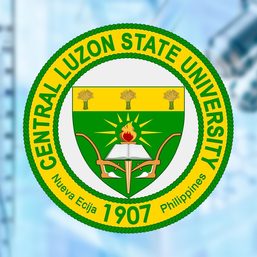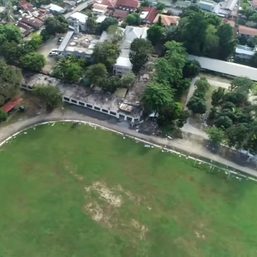SUMMARY
This is AI generated summarization, which may have errors. For context, always refer to the full article.

CAGAYAN DE ORO, Philippines – The Jesuit-run Ateneo de Davao University (AdDU) is emerging as a major player in aerospace engineering in the country, showcasing its capabilities at the just-held Spaceport America Cup 2024 in New Mexico, United States.
Competing in the commercially off-the-shelf (COTS) category and amid cheers on Saturday, June 22, the AdDU team launched the rocket, Sibol (growth), to a target altitude of 10,000 feet, aiming to hit the mark without substantial deviation.
In a statement, the AdDU said weather conditions were a major consideration, and the rocket lifted off as soon as the rain stopped. The 9.7-foot rocket soared to the required 10,000 feet and returned to Earth with an 8.8-pound payload. It was subsequently recovered safely from the field.

The student team lead, Franz Carlo Guevara, described the launch as “a victory for Filipinos who aim for excellence and innovation in space technology.”
Spaceport USA directors called it “a great achievement” for a first-time team, according to AdDU.
The Spaceport America Cup, held from June 17 to 22, is the world’s largest intercollegiate rocket engineering competition, featuring around 200 teams from 20 countries. AdDU’s Rocketry Team made history by becoming one of the two representatives from Southeast Asia, alongside a team from Thailand, to compete in this prestigious event.
Organizers said over 1,700 students and faculty gathered for the annual Spaceport America Cup, drawn by the opportunity to collaborate and compete at a world-class spaceport facility, representing the best and brightest from more than 150 institutions from all around the world.
Beyond the competition, the AdDU Rocketry Team plays a crucial role in the University’s Rocket Development Program, Project Sugod. The initiative aligns with AdDU’s mission to advance aerospace engineering in the Philippines, according to Atenews.ph, the university’s official student publication
“We aim not just to compete in future Spaceport America Cup competitions, but also inspire and nurture a new generation of Filipino engineers and scientists, positioning our country as a burgeoning hub for aerospace innovation,” said Jesuit priest Father Karel San Juan, AdDU president in the Atenews report.
“This is ADDU’s humble contribution to the development of space technology…. This historic competition is just the beginning for ADDU, Mindanao, and the Philippines,” read part of San Juan’s statement on Saturday.
AdDU is the only university in Mindanao offering a Bachelor of Science in Aerospace Engineering (ASE)
Dr. Rogel Mari Sese, chairman of AdDU’s Aerospace Engineering Department, expressed hope that the achievement would bolster the field of rocket technology in the Philippines and position Mindanao as a prime location for aerospace technology development, given its ideal geographical conditions for rocket launching.
He said the university planned to continue to build better rockets and develop other space technologies.
“We [Mindanao] have a very good geography in terms of location. We have a very good location for launching rockets not just as test launches but eventually, in the future, I hope that we can launch rockets also into outer space,” Atenews quoted Sese as saying.
Sese said he was optimistic about the increasing interest in aerospace engineering among students, noting a rise in enrollment in AdDU’s aerospace engineering department since 2018.
Engineer Wilfredo Pardola Jr., who was part of the team that built TALA, the Philippines’ first hybrid rocket, emphasized that the growth of the aerospace industry is a collective effort that contributes to nation-building.
TALA, the first high-powered hybrid rocket developed in the Philippines, was in May 2023. The rocket deployed its Can Satellite payload before descending and deploying its main parachute for a safe landing.
“Nation-building is really a collective effort in terms of the space technology applications. To improve that [rocket technology] one and to continue the efforts in the space technology application here in the Philippines, we have this growth not just on rockets but the whole aerospace industry here in the Philippines,” Pardola said.

The AdDU Rocketry Team’s journey to the Spaceport America Cup was a rigorous process, working on the rocket for a year.
Guevara said they qualified after an initial screening of the school’s qualifications and the submission of several technical reports starting in November 2023.
“We started applying for the Spaceport America Cup in the initial screening to determine if the school could participate in the competition. There were a series of evaluations where we had to submit technical reports, which happened to be three. And last May, we had to submit a technical report which consisted of all the specifics for the rockets,” Guevara said.
After submitting the reports, the team underwent a flight readiness review in May, which they passed. The review allowed them to describe the rocket and explain its specifics, leading to their approval to participate in the contest.
Team structures lead Avery Clyde Dimasuhid said team members faced challenges of balancing academics and rocket preparation.
“Difficult i-juggle ang amoa academics ug other duties. And, just after final exams, didto na mi nag banat ug prepare for the rocket. But, during those days nga naa mi klase, naa mi work, naga prepare mi for the progress reports, nga, fortunately pud, na pasar pud namo,” Atenews quoted him as saying.
(It’s difficult to juggle our academics and other duties. And, just after the final exams, we started preparing for the rocket. But, during those days when we had classes, we were working, preparing for the progress reports, which, fortunately, we also passed.) – Rappler.com
Add a comment
How does this make you feel?




![[EDITORIAL] Post-Sara Duterte resignation: Ang trahedya at ang pag-asa sa edukasyon](https://www.rappler.com/tachyon/2024/06/animated-sara-duterte-resigns-as-deped-chief-carousel.jpg?resize=257%2C257&crop_strategy=attention)
![[The Slingshot] Blunders and mess Sara left behind at DepEd](https://www.rappler.com/tachyon/2024/06/TL-Sara-Duterte-DepEd-June-24-2024.jpg?resize=257%2C257&crop_strategy=attention)

![[In This Economy] Duterte exits DepEd: Good riddance!](https://www.rappler.com/tachyon/2024/06/tl-duterte-exits-good-riddance-June-21-2024.jpg?resize=257%2C257&crop=220px%2C0px%2C720px%2C720px)

![[Rappler’s Best] Welcome to the battlefield](https://www.rappler.com/tachyon/2024/05/maria-ressa-harvard-scaled.jpeg?resize=257%2C257&crop=133px%2C0px%2C1920px%2C1920px)


There are no comments yet. Add your comment to start the conversation.